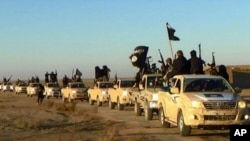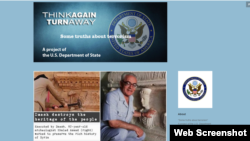Sixteen years after the United States launched its war on terror, there are nagging concerns that aspects of the war have not gone well. And when it comes to the battle of ideas, some experts and officials fear the U.S. may be losing.
“There is an element to killing the jihadists, so they can’t kill us,” said Congressman Michael McCaul, the chair of the House Homeland Security Committee. “We have been able to stop and prevent a lot of [terror] plots from happening in the United States.”
“But there’s also an element that drone strikes alone can’t win a war of ideology,” McCaul added.
Current and former U.S. officials say the failure to counter narratives that help fuel groups like al-Qaida and Islamic State is not due to a lack of effort. But so far, they admit, the results have not been good.
“I’m alarmed at the spreading of the ideology,” White House homeland security adviser Tom Bossert said last week at a security summit in Washington.
“We’ve got upwards of 17 or 18 nation states that might be failed, or viewed as close to failing, and they have a strong presence of either ISIS or al-Qaida or other groups,” he said. “That is a troubling development.”
Initially, U.S. officials placed much of their hope on a military victory against Islamic State in Iraq and Syria, reasoning that once the terror group’s self-declared caliphate crumbled, so would the group’s appeal.
However, Islamic State's ongoing losses on the battlefield have failed to dampen the appeal of its jihadist ideology.
“We're putting a stake in the heart of ISIS, who is the main perpetrator of all this,” Director of National Intelligence Dan Coats told an audience this past July. “But it's like putting a stake in an octopus, with all the tentacles moving out to different places.”
Other U.S. efforts to directly counter IS messaging and other jihadist ideology quickly faltered. Some early State Department initiatives, like the “Think Again, Turn Away” Twitter feed, even were ridiculed for lacking meaningful engagement.
Since then, U.S. efforts have been focused on empowering partner organizations to help beat back the IS narrative.
Progress has been slow, but some former officials say President Donald Trump needs to give these efforts more time.
“It seems to me there’s actually been a stepping back, in particular from some of the structures that were built specifically to deal with the ideological dimension,” said Joshua Geltzer, a former senior director for counterterrorism at the National Security Council.
Geltzer and other former officials have voiced concerns about the Trump administration’s plans to cut funding for such programs, after freezing grants to partner organizations.
Even with more time, though, some current and former officials say there may be limits to what the U.S. can do.
“Truly altering the environment that gives rise to the terrorist threat we face, that’s a much more formidable task,” Nicholas Rasmussen, director of the U.S. National Counterterrorism Center, said earlier this year. “More resources are required, more time is required, and more patience is required.”
So, too, there are signs that the U.S. is struggling with defining what it wants to do and what it hopes to accomplish.
“We have a very militarized view of what this battle is,” said Jasmine El-Gamal, who was a translator and cultural adviser for the U.S. Army’s 82nd Airborne Division in the early days of Operation Iraqi Freedom.
“When we say 'countering violent extremism' it’s really counterterrorism. It’s really that we use bombs, we use drones, we use armies,” said El-Gamal, now senior fellow at the Atlantic Council.
“There seems to be some conceptual confusion in the U.S. government about what 'countering violent extremism' programs are attempting to do,” according to a report released Monday by New America’s International Security program.
“Counter-radicalization - turning many millions of Muslims around the world away from radical ideas - seems both a nebulous mission and one that may not be achievable,” the report stated.
Some experts also say U.S. allies in the Middle East could be doing much more to help counter extremists' ideology.
“Most Arab states are not interested in uprooting the tree, but just taking the poisonous fruits when convenient,” said New America Fellow Nadia Oweidat.
“As long as there are blasphemy laws, you don’t even dream about countering terrorism, because the very people who can take on these ideas from within - who know the Quran by heart, people who went to school all their lives in the Middle East - are people who would be blasted as blasphemous,” she said.


